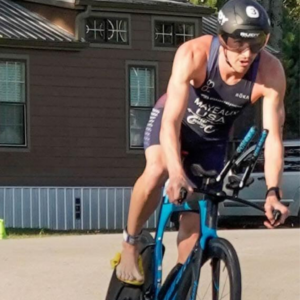
Can You Perform While Dehydrated?
Is there performance through dehydration?
As seen on TrainingPeaks.
Scientifically speaking, dehydration occurs when you’re using more water than you’re taking in, usually due to sweating, excessive vomiting/diarrhea/urination, or insufficient water intake. Among other symptoms, dehydration causes a reduction in blood plasma, which increases blood viscosity, or thickness. This makes it more difficult for your heart to pump, causing an elevated heart rate and a reduction in sweating; an increase in core temperature, and an increase in the glycogen utilization rate.
How much dehydration can you tolerate before your performance suffers? From the 1980’s and into the 90’s the general consensus was that a water loss of about 2 percent body weight would start to diminish performance. Only recently did we realize this view was flawed. The studies behind the 2 percent rule were produced in controlled lab experiments involving the use of saunas, hot baths, and diuretics. Some were conducted with a treadmill test in which the runner would run as long as they could possibly go.
Most coaches agree by now with Andy Blow from Precision Hydration that “lab tests are not the same as real world performance.” In 2001, as scientific interest in elite sports began to grow, South African Scientist, Dr. Tim Noakes further tested the data around hydration and performance by looking at Marathon and Ironman races, which led to his “drink to thirst” hydration theory.
In January 2009 at the Dubai Marathon, with the temperature around 75° F, way too warm for breaking records, Haile Gebrselassie won the race in 2:05:29. When he finished he had lost 10% of his body weight. In the New Zealand and South Africa Ironman races, the faster finishers had lost at least 2-5% of their body weight. Those further back in the pack were either maintaining hydration or even gaining weight. This revealed that being hydrated can actually dampen performance.
The 2 percent rule doesn’t always adversely impact performance, and doesn’t apply to everyone. So, the real question is: how much weight can we actually tolerate losing? This is different for different people. In Geb’s Dubai Marathon performance his glycogen and blood sodium levels were likely completely stocked. He was probably even a few pounds heavier than he normally would be at the starting line. Every gram of carbohydrates you store means you’re likely holding 2-3 grams of water. However, most people’s performance will suffer at some point after the 2-4% range and there will always be outliers.
While there is no one-size-fits all hydration strategy for every athlete, it’s worth understanding that drinking as much as you can all the time isn’t necessarily the best approach. Similarly, “Drink to thirst” might work for some events, but be less suitable for others (or other athletes). Understanding how dehydration affects you and your performance is highly personal, and it’s a key step to reaching your goals.
ABOUT WILLIAM RITTER
William Ritter, from Tyler Texas is the Head Coach at Fly Tri Racing. He is a TrainingPeaks Level 2 Accredited Coach, Ironman U, USA Cycling, and USA Track and Field Certified Coach and USATF Cross Country Specialist. He specializes in coaching triathletes and runners of all abilities. Ritter’s coaching is detailed and based on the individual athlete blending the art and science of coaching. To learn more about Ritter and personal coaching visit www.flytriracing.com
https://www.ncbi.nlm.nih.gov/pubmed/9303999
https://www.researchgate.net/publication/6078653_Does_Dehydration_Impair_Exercise_Performance
https://www.ncbi.nlm.nih.gov/pubmed/12466696
https://www.ncbi.nlm.nih.gov/pubmed/17454547
https://www.bbc.com/news/magazine-30046426
Waterlogged: The Serious Problem of Overhydration in Endurance Sports by Professor Tim Noakes
The Science of Hydration. Precision Hydration. Andy Blow



